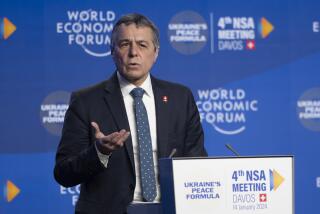Shevardnadze, All Smiles, Calls for Better Relations
- Share via
HELSINKI, Finland — Eduard A. Shevardnadze, full of smiles and praising peace in his first foreign visit since he was named Soviet foreign minister on June 2, called Monday for a “radical improvement” in East-West relations.
The man who replaced Andrei A. Gromyko, the Kremlin’s foreign minister for 28 years, made his statement as he arrived for a meeting of foreign ministers on the 10th anniversary of the Helsinki accords on security and cooperation in Europe, which opens here today.
For the record:
12:00 a.m. July 31, 1985 For the Record
Los Angeles Times Wednesday July 31, 1985 Home Edition Part 1 Page 2 Column 1 Foreign Desk 1 inches; 25 words Type of Material: Correction
Because of an editing error, The Times on Tuesday misreported the date on which Eduard A. Shevardnadze was appointed foreign minister of the Soviet Union. The correct date is July 2.
Unlike the dour Gromyko who was elevated to the largely ceremonial post of president, the silver-haired Shevardnadze frequently flashed a big grin and stopped briefly to talk to reporters after his plane arrived from Moscow. Asked what his most important task at the Helsinki gathering would be, he replied: “To defend peace.”
Shevardnadze and Secretary of State George P. Shultz have set aside three hours on Wednesday afternoon for private talks on the planned November U.S.-Soviet summit, the deadlock in Geneva arms control negotiations and other issues.
The presence of Soviet and American arms control experts in Helsinki stirred speculation that an effort will be made to break the deadlock that developed in Geneva after two rounds of talks.
Chief U.S. negotiator Max M. Kampelman and Paul H. Nitze, special adviser to President Reagan on arms control, joined the American delegation. On the Soviet side, chief arms negotiator Yuli A. Kvitzinsky and one of his aides are present here. The Soviet ambassador to Washington, Anatoly F. Dobrynin, also is a member of the delegation.
Shevardnadze and Shultz may spend part of their time discussing arrangements for the November meeting in Geneva between President Reagan and Soviet leader Mihail S. Gorbachev, one U.S. diplomat said.
Today, however, the two foreign ministers are expected to clash over the issue of human rights when they make public statements at the formal conference meeting.
The Soviet Union has hailed the Helsinki accords as a keystone of detente and denied Western charges that it has ignored pledges contained in the 1975 accords to expand rights of free expression, travel and immigration. The United States has charged that the Soviet human rights record in the past decade is even worse than it was before the accords went into effect.
‘Cheap, Hypocritical Rumpus’
In Moscow, the Communist Party newspaper Pravda said the West has violated the Helsinki agreements. Pravda said “the cheap and hypocritical rumpus” in the West about human rights is “a pretext for interference in the internal affairs of countries whose political system they want to undermine.”
Shevardnadze endorsed the “spirit of Helsinki,” which he said encouraged detente and peaceful coexistence between Communist and capitalist states. “This historic document . . . remains a good foundation for the development of mutual understanding and cooperation in Europe, and not only in Europe,” he said in a written statement.
“We are convinced that the current tense situation in the world calls for joint efforts aimed at radically improving the political climate in Europe and in international relations as a whole,” he added.
Shevardnadze’s comments will be monitored closely by other foreign ministers at the three-day conference for any changes in Kremlin foreign policy since Gorbachev was named Soviet leader last March.
Review of Results
Representatives of 33 European countries, the United States and Canada will review results under the accords that were born 10 years ago in the heyday of detente and stress “fundamental rights, economic and social progress and well-being for all peoples” and the need to promote world peace and security.
The Soviet Union has insisted that the conference put the stamp of approval on Europe’s postwar borders, effectively ratifying Soviet influence over Eastern Europe. The United States, however, has denied that the accord is a substitute for a formal peace treaty between the once-warring nations. In addition, the Western countries have placed greater emphasis on Helsinki pledges to expand individual rights, often neglected in Communist countries. But West German Foreign Minister Hans Dietrich-Genscher, in a statement on arrival, said the Helsinki process must continue despite disappointments and setbacks.
“This is the only way, the way of cooperation and building trust,” he said.
More to Read
Sign up for Essential California
The most important California stories and recommendations in your inbox every morning.
You may occasionally receive promotional content from the Los Angeles Times.













